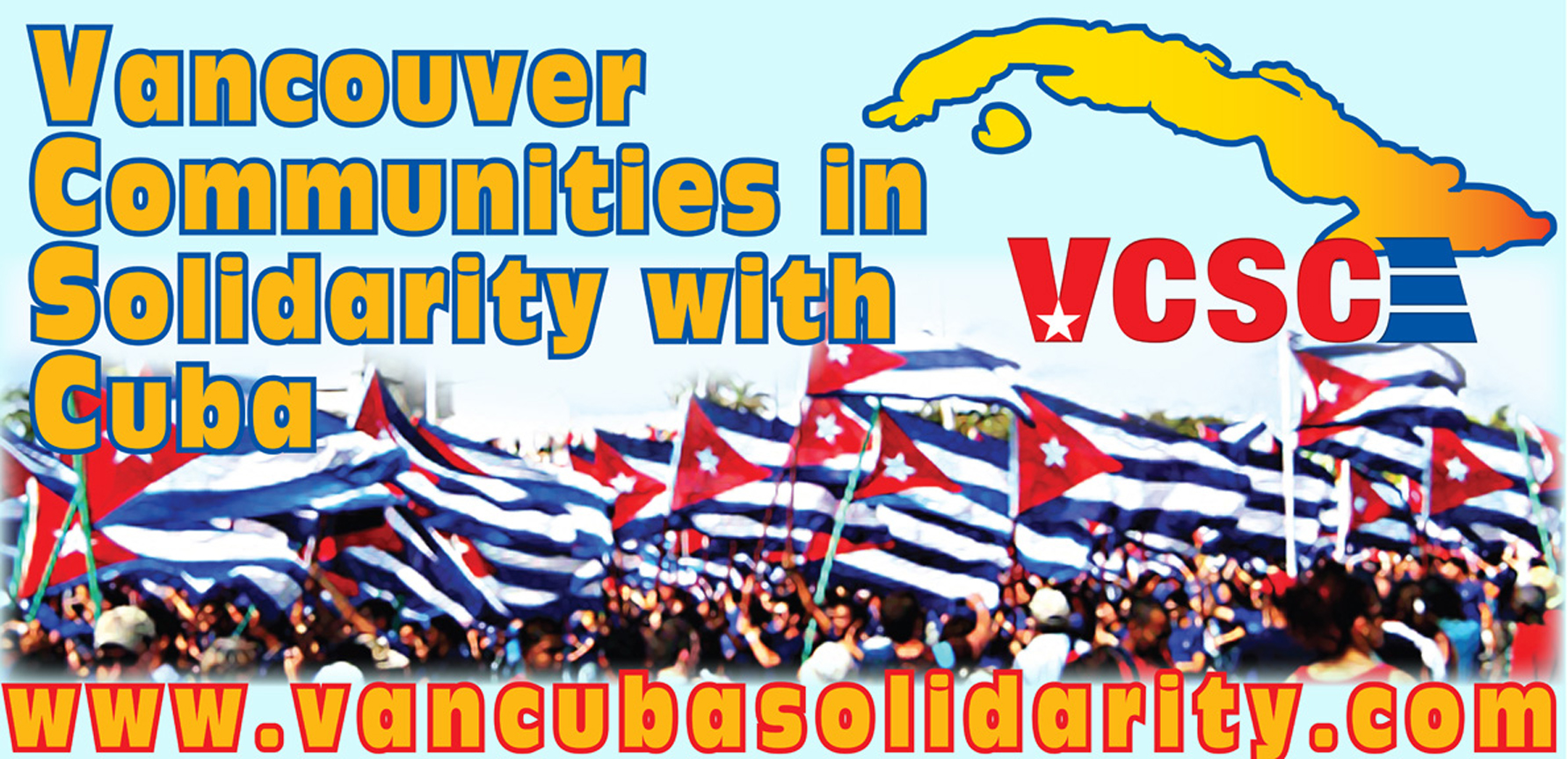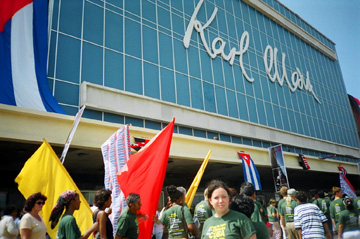




 Summer 2005
Summer 2005Visiting Cuba Through the Eyes of a Young Canadian Activist
A Memoir of a trip with Adventure, Education and Politics!
OR
How I Learned to Love Cuba!
First Appeared in the Fire This Time Newspaper
Part 1
go to part II!
go to part III!
By Sophie Ziner
Last summer, I had the opportunity to travel to Cuba. It came about while we were up to our necks in organizing the rally that Vancouver Communities in Solidarity with Cuba held against anti-Cuban terrorist Luis Posada Carrilles.
I was supposed to travel back east for a family gathering, but, being preoccupied with the rally, I missed my plane, and most of my family was very angry with me. But a few days later, I got a call from my great Uncle Irv, who said, “I’ve just heard that you’re interested in Cuba. I go on a trip to Cuba every year, and I was wondering if this year you’d like to join me?” Of course, I said, “YES! I’d love to!”
I first learned about Cuba through the Free the Cuban Five Committee - Courtenay in my hometown on Vancouver Island, and since moving to Vancouver last spring, have been organizing with the Free the Cuban Five Committee - Vancouver and Vancouver Communities in Solidarity with Cuba. For a young person, and someone who cares about social justice, Cuba is a very inspiring place, with its legendary free universal education program, its universal health care program, the advances in agriculture and the thousands of other gains that we hear about.
Cuba, after throwing off Spanish colonial rule, found itself still crushed by US imperialism in the first part of the 20th century.
Through a series of US backed dictators, Cuba was turned into a gangster’s paradise, full of casinos and prostitution. Most of the people of Cuba lived in dire poverty, and with disease and illiteracy.
In 1959 however, a popular revolution in Cuba chased US imperialism out to sea. The revolutionary government immediately nationalized the land and instituted heath and education programs, and ever since has continued to fight to build a dignified and humane society in the face of the ruthless aggression of imperialism.
Under the grips of a US imposed blockade for 44 years, the people of Cuba have had to face great restrictions to medicine, food and technology. They have also suffered from terrorist attacks committed by groups funded and backed by the FBI and the CIA.
Yet in spite of this Cuba has more doctors per capita than any other country in the world, and has free universal health care and post secondary education. Looking at the example Cuba shows us, resource rich countries like Canada really have no excuse for the constantly diminishing access to social services that are basic human rights, like education and healthcare.
It was with these thoughts in my head that I took a bus down to McAllen, Texas, to meet my Uncle and the group of people we would be traveling with. We were going to Cuba with a group called Pastors for Peace, an organization based in the US, which has worked for many years in solidarity with Cuba to break the US blockade. Pastors for Peace had organized Caravans of busses, which traveled North America collecting humanitarian aid (medical supplies, computer equipment, sports equipment etc) in a symbolic gesture of solidarity to bring to Cuba. One hundred twenty people met in Texas, the aid was sorted, and we embarked on the trip across the border.
Five of the busses were named for each of the Cuban Five, Gerardo Hernandez, Antonio Guerrero, Ramon Labanino, Rene Gonzalez and Fernando Gonzalez, the five Cuban heroes who have been held in US prisons since 1998 for collecting information about terrorist organizations who work out of Miami to routinely attack the Cuban people. The Five had collected the information and turned it in to the FBI. They were immediately arrested and charged with a range of charges, from espionage to conspiracy to commit murder. The Cuban campaign to free the Cuban Five is huge, and because of it, committees for the release of the five have been organized around the world. It was in the spirit of the unrelenting determination of Cuba and of the Five to expose the hypocrisy of US imperialism that we faced US customs. This was the 16th Caravan to Cuba that Pastors for Peace had organized, and because of the ever tightening restrictions the US administration has been placing on Cuba, we knew to expect resistance at the border from US customs officials.
When the first of six busses attempted to cross the border, it was stopped and towed, and Customs agents began unloading everything and confiscating everything that was computer related. The rest of the busses pulled back, and we began carrying the aid from the first bus by hand, with the hot midday sun on our necks, over the border to Reynosa, Mexico.
Once we returned over the border, it was decided that we would pull the rest of the aid off of the remaining busses, remove out the computer equipment, put it all on one bus, which would stay behind, and reload the rest of the busses back up and attempt to cross again.
We worked in the dusty field behind the “Whattabuger”, lifting boxes of medical equipment, school supplies, bikes, all sorts of things that people had donated as the caravan made its way through Canada and the US for the several weeks before. It took us until 3a.m. to unload and reload all 180 tons of goods onto the busses, but when we were finished, we got back on them and were able to cross the border. The bus filled with the computer equipment was left behind with a small group of organizers who would remain with it, campaigning to have the computers that were confiscated released, and to be allowed to take all the computers across the border.
After meeting up with the 30 people from Mexico who would join us in Cuba, we set off the next morning and traveled from Reynosa to Tampico, in the south east, the busses were loaded onto a barge, and we boarded our Air Cubana flight and took off into a bright blue sky, to Cuba.
I sat in my seat on that airplane and could hardly sit still I was so excited. Cuba to me was a place where, in the face of ever growing attacks on humanity all over the world from the forces of imperialism, a struggle for justice, for genuine gains for regular people was still being fought fiercely. To me Cuba was a place where you could “Imagine all the people, living life in peace...” just like John Lennon sang.
The clouds broke beneath us, and all of a sudden, we could see the island, edges crisp in a blue gray sea, perfect and green. As we began our decent into Havana, my heart beat faster- would Cuba live up to my expectations, to the hopes and dreams it represented to me and to so many people around the world?
To be continued…
go to part II!